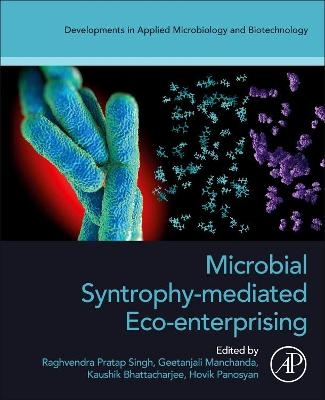
Microbial Syntrophy-mediated Eco-enterprising
Academic Press Inc (Verlag)
978-0-323-99900-7 (ISBN)
The term syntrophy for nutritional interdependence is often used in microbiology to describe the symbiotic relationship between bacterial species. Understanding such interactions can be of considerable interest when we come to manipulate microbes to our own benefit, such as by disrupting pathogenic communities with antibiotics or by promoting efficiency in communities that produce energy or break down waste.
Dr. Raghvendra Pratap Singh is an eminent scientist in the Microbial Biotechnology. He has received his PhD from Gurukul Kangri University, India and is presently working in Research and Development Division, Uttaranchal University, Dehradun. Since 2014-2016, He worked as Research Scientist in Shandong University. His research contributions relate to the area of ecology of myxobacteria, plant-microbes interaction and microbial genomics. He is member of Aquatic Biodiversity Society and has a certification from Food and Drug association of India. He has received several awards and grants from various scientific agencies and societies such as Young Scientist award by ABA-2017, SERB-DST grant, Chinese Postdoctoral Grant, DBT travel grant etc. He has participated as Speaker in several National and International scientific meets and conferences such as FEMS-2013 in Stresa, Italy, Myxo-2016 in Switzerland, AMI, PTPB-2014 etc. Dr. Geetanjali Manchanda is working as Head of the Botany Department in DAV University, Jalandhar, India. She received MSc degree from Delhi University and PhD from Panjab University, Chandigarh. She has extensively worked on plant microbe interactions in stressed and contaminated environments with special focus on mycorrhizae for the fortification of various crops. She has received the prestigious research grants from DST, India, and IFS Sweden. She has contributed immensely to the scientific community by publishing research papers and book chapters. She had recently authored three books in which one book is on the use of omics technology for microbiology that has been published by ICAR, New Delhi, India. Dr Kaushik Bhattacharjee is a scientist in the field of Microbiology in the Division of Life Sciences, Institute of Advanced Study in Science and Technology, Guwahati, India. Dr Kaushik Bhattacharjee received his PhD in microbiology from the North-Eastern Hill University of India, by conducting research into the inter-disciplinary field of microbial diversity in extreme environments, pharmaceutical microbiology, and medicinal chemistry. His post-doctoral training was at the Department of Botany, North-Eastern Hill University of India and at IASST, Guwahati, India. He has so far contributed over 20 publications in journals of high repute and has published about six book chapters. He also serves as an editorial board member and invited journal reviewer for many highly reputed journals with publishing groups, such as Springer Nature, Elsevier, PLoS, Taylor & Francis. He was presented with the Outstanding Reviewer Award from Elsevier for the year 2018. He also serves as a certified mentor at Publons Academy, Clarivate Analytics, USA. His broad area of research interests includes, environmental microbiology, and pharmaceutical microbiology. Professor Hovik Panosyan graduated in Biology from Yerevan State University (YSU) in 1999. He received his PhD in microbiology from Institute of Botany of NAS of Armenia in 2003. He has been a faculty member at YSU since 2002 and was promoted to Associate Professor in 2011. His main research area is Microbial Ecology and Biology of Extremophilic Microbes. He has been awarded numerous research fellowships and awards including FEBS Short-Term Fellowship (2009 and 2004), FEMS Research Fellowship (2009), NFSAT (2011) DAAD (2013) and has participated in international research together with USA, European and Asian partners. Dr. Panosyan is actively engaged in studying of microbial community of extreme environments (terrestrial geothermal springs, alkali-saline soils, subterranean salt deposits, copper and molybdenum mines distributed on the territory of Armenia) based on culture-dependent and molecular techniques. He has published more than 60 research papers in peer-reviewed journals, 4 books and 25 chapters.
1. Anabaena-azollae, significance and agriculture application: A case study for symbiotic cyanobacterium
2. The bioremediation of agricultural soils polluted with pesticides and herbicides
3. Multifunctional properties of polysaccharides produced by halophilic microorganisms and their new approaches in biotechnology
4. Microorganisms in metal recovery – tools or teachers?
5. Endophyte: A promising biostimulant to modulate secondary metabolites biosynthesis in plants
6. Biotechnological Upgrading of Heavy Crude Oil
7. Microbial approaches for amino acids production
8. Pseudomonas for sustainable agricultural ecosystem
9. Relationship between organic matter and microbial biomass in different types of vegetation
10. Molecular mechanisms of stress adaptation by bacterial communities
11. Synergism in microbial communities facilitate the biodegradation of pesticides
12. Bioproduction of terpenoid aroma compounds by microbial cell factories
13. Microbial mediated remediation of pesticides: A sustainable tool
| Erscheinungsdatum | 23.02.2022 |
|---|---|
| Reihe/Serie | Developments in Applied Microbiology and Biotechnology |
| Zusatzinfo | 30 illustrations (20 in full color); Illustrations |
| Verlagsort | Oxford |
| Sprache | englisch |
| Maße | 191 x 235 mm |
| Gewicht | 770 g |
| Themenwelt | Naturwissenschaften ► Biologie ► Mikrobiologie / Immunologie |
| ISBN-10 | 0-323-99900-X / 032399900X |
| ISBN-13 | 978-0-323-99900-7 / 9780323999007 |
| Zustand | Neuware |
| Haben Sie eine Frage zum Produkt? |
aus dem Bereich


